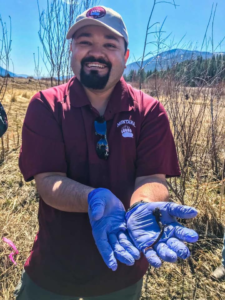McNair Scholars: Nominate potential grad students
There is a reason why the coordinators of SOU’s McNair Scholars Program reach out to faculty members at about this time each year, seeking nominations of promising students to fill out the university’s next cohort of potential graduate school candidates. Most participants since the McNair program began at SOU in 2003 have stood out in the classroom and been steered by their professors toward the U.S. Department of Education program.
“If you know any undergraduate students … who you think may have academic potential and may want to go on to attend graduate school after completing a bachelor’s degree, please mention the program to the student and/or send an email to McNair@sou.edu to nominate that student to the SOU McNair Scholars Program,” said Naomi McCreary, coordinator of the SOU program.
Nomination emails should include the student’s name and email address. Students can be from any academic major, must have completed at least two terms of college and can enter the program as sophomores, juniors or early in their senior years. McCreary described McNair as “a specialized graduate school preparatory program of activities and instruction that the participants engage in over a minimum of a calendar year.”
The SOU program offers one-on-one guidance from faculty mentors as it helps participants complete their undergraduate degrees, enroll in graduate school and prepare for doctoral studies. Scholars complete an eight-week research internship in the summer, attend weekly seminars to help prepare them for testing and graduate school applications, and travel to national McNair conferences and graduate program visitations.
The program is named for Dr. Ronald E. McNair, who was a member of the Challenger space shuttle’s seven-person crew that met a tragic end in a 1986 explosion. As a tribute to his achievements, Congress and the McNair family in 1989 aformed the Ronald E. McNair Post-baccalaureate Achievement Program – administered by the U.S. Department of Education – to assist young people in both following McNair’s path and taking the initiative to chart their own courses.
The grant helps underrepresented and first-generation undergraduate students from low-income backgrounds to prepare for research-intensive doctoral programs. However, McCreary urged faculty members to nominate any students they feel may have the ability and desire to complete graduate school, and eligibility will be sorted out during the application process.
The McNair program at SOU received word in August that it has been renewed by the Department of Education for a new, five-year grant cycle. The SOU program has provided an intensive research experience and graduate school preparation to more than 160 students since its inception in 2003. Under the new grant, 28 students each year will share the prestige of being McNair Scholars.




 Gómez is proud of his family’s farm-working and immigrant roots, and that both he and his brother Edrik – who died in a
Gómez is proud of his family’s farm-working and immigrant roots, and that both he and his brother Edrik – who died in a 



